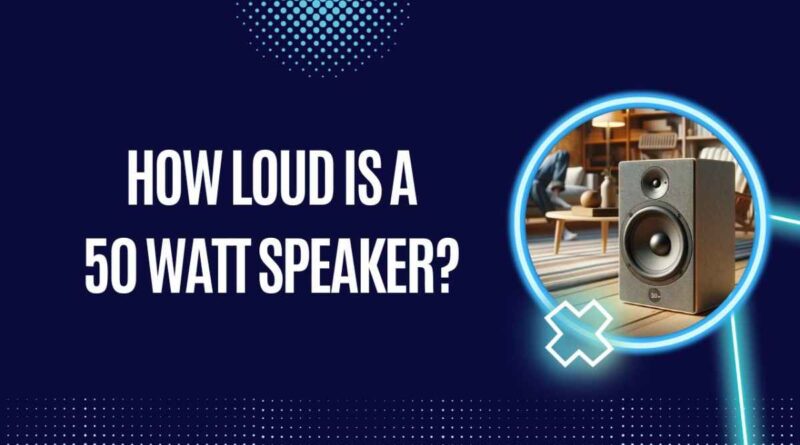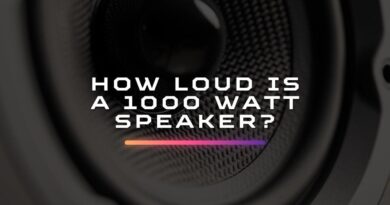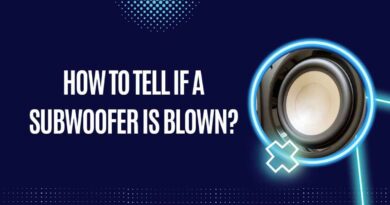How Loud Is A 50 Watt Speaker?
Understanding the wattage of a speaker is crucial when it comes to achieving the desired sound quality and volume in your audio setup. In this article, we will delve into the topic of how loud a 50 watt speaker can be and explore the factors that influence its loudness.
When it comes to speakers, wattage refers to the amount of electrical power the speaker can handle or deliver. It is often perceived that higher wattage means louder sound, but it’s not as simple as that. Wattage is just one factor among many that contribute to the overall loudness and sound quality of a speaker.
To comprehend the concept of speaker wattage more effectively, let’s provide an overview. Speaker wattage is generally categorized into two types:
- RMS Power: This refers to the continuous power capability of a speaker without distortion or damage. It gives you an idea of the average power output.
- Peak Power: This represents the maximum power capacity a speaker can handle for short bursts or peaks in sound.
While these power ratings are essential for understanding a speaker’s capabilities, they alone do not determine how loud a 50 watt speaker can be. Other factors such as efficiency, room acoustics, and audio types also play significant roles in determining perceived loudness.
In the following sections, we will explore these aspects in detail to provide you with a comprehensive understanding of how loud your 50 watt speakers can actually get. So let’s dive into the science behind speaker wattage and loudness!
The Science Behind Speaker Wattage and Loudness
Understanding the science behind speaker wattage and loudness is crucial in order to make informed decisions about audio setups and achieve optimal sound quality. In this section, we will explore the concepts of speaker wattage, decibels, sound pressure level (SPL), and speaker efficiency to gain a deeper understanding of how these factors contribute to the overall loudness of a speaker.
Explaining Speaker Wattage
Speaker wattage refers to the amount of power that a speaker can handle or produce. It is typically measured in watts (W). The wattage rating of a speaker indicates its maximum power handling capabilities. Higher wattage does not necessarily mean louder sound. Instead, it signifies the potential capability of the speaker to handle more power without distortion or damage.
Understanding Decibels and Sound Pressure Level (SPL)
Decibels (dB) are used to measure the intensity or loudness of sound. Sound pressure level (SPL) is a specific measurement of sound intensity and is also expressed in decibels. SPL is logarithmic, meaning that each increase of 10 dB represents a tenfold increase in sound intensity.
To put this into perspective, let’s consider an example: if Speaker A produces a sound at 80 dB SPL and we introduce Speaker B, which has double the power, it will only result in a 3 dB increase in SPL. This demonstrates that doubling the power does not lead to a significant increase in perceived loudness.
The Role of Speaker Efficiency in Determining Loudness
Speaker efficiency plays a significant role in determining how loud a speaker can get with a given amount of power input. Efficiency refers to how effectively a speaker converts electrical energy into sound energy. A more efficient speaker can produce louder sound with less power input compared to an inefficient one.
Efficiency is measured by how much sound pressure level (SPL) a speaker can produce at a specific distance with a given amount of power. For example, if Speaker A and Speaker B both receive the same 50 watts of power, but Speaker A produces a higher SPL, it is considered more efficient.
It’s important to note that speaker efficiency is not solely determined by wattage. Other factors such as the design of the speaker, the materials used, and the overall construction also influence efficiency.
Summary
- Speaker wattage represents the power handling capabilities of a speaker, indicating its maximum capacity without distortion or damage.
- Decibels (dB) measure sound intensity, while sound pressure level (SPL) specifically quantifies sound intensity in decibels.
- Speaker efficiency determines how effectively a speaker converts electrical energy into sound energy and influences the loudness achieved with a given amount of power input.
- Understanding these concepts provides a solid foundation for comprehending how speaker wattage, decibels, sound pressure level, and efficiency work together to determine the loudness of a speaker.
Other Factors Influencing the Loudness of a 50 Watt Speaker
When it comes to the loudness of a 50 watt speaker, there are several factors beyond wattage that can influence the overall sound quality and volume. Understanding these factors is crucial for optimizing your audio setup and achieving the best possible listening experience. Let’s explore three key elements that play a significant role in determining the loudness of a 50 watt speaker:
1. Impact of Room Acoustics
The acoustic characteristics of the room in which your speakers are placed can have a substantial impact on both sound quality and loudness. Room size, shape, furnishings, and materials all contribute to the way sound waves interact within the space. Here are some important points to consider:
- Reverberation: The amount of echo or reverberation in a room can affect how the sound from your speakers is perceived. A room with hard surfaces like bare walls and floors tends to produce more reflections, which can result in a less focused and muddier sound. On the other hand, a room with soft furnishings or acoustic treatment can help absorb excessive reflections and improve clarity.
- Standing Waves: In certain room dimensions, sound waves can bounce between parallel surfaces and create standing waves. These waves can cause certain frequencies to be amplified or canceled out at specific locations within the room, resulting in uneven frequency response and potential dips or peaks in loudness.
- Placement: The position of your speakers within the room can also impact their overall loudness. Placing speakers near walls or corners can enhance bass response due to boundary reinforcement but may result in a boomy or overpowering sound. Experimenting with speaker placement and utilizing room correction techniques can help achieve a more balanced soundstage.
2. Significance of Audio Types
Different types of audio signals, such as music, movies, and speech, can have varying levels of complexity and dynamic range. This variation in audio content can influence the perceived loudness, even when delivered through a 50 watt speaker. Here’s how different audio types can affect loudness:
- Music: Music often exhibits a wide dynamic range, ranging from soft passages to powerful crescendos. The peaks in music can push the limits of a speaker’s capabilities, requiring more power to accurately reproduce the full range of dynamics. A 50 watt speaker with good power handling capabilities can handle these dynamic swings and deliver an engaging musical experience.
- Movies: Movies frequently feature explosive action sequences and intense sound effects. These moments demand speakers that can handle sudden bursts of high volume without distortion. While a 50 watt speaker may not match the sheer output of larger systems, it can still provide an immersive movie experience in smaller rooms or for personal listening.
- Speech: Speech-based content like podcasts or audiobooks generally has a narrower dynamic range compared to music or movies. As a result, a 50 watt speaker should easily handle speech reproduction with clarity and sufficient volume.
3. Importance of Power Handling Capabilities for Speakers
While the wattage rating of a speaker provides an indication of its power handling capabilities, it is not the sole determinant of loudness. Speaker efficiency and sensitivity also play vital roles in how effectively the amplifier’s power is converted into sound waves. Here’s what you need to know:
- Efficiency: Speaker efficiency refers to how well a speaker converts electrical power into acoustic energy. Speakers with higher efficiency ratings require less power to produce the same volume as less efficient speakers. Therefore, a 50 watt speaker with high efficiency will generally be louder than one with lower efficiency when both are driven by the same amplifier.
- Sensitivity: Speaker sensitivity is another crucial metric that affects loudness. It measures how much sound pressure level (SPL) a speaker produces when given a specific input power level. Higher sensitivity ratings indicate that a speaker can produce louder sound outputs with the same amount of power. When combined with efficient amplifier matching, a 50 watt speaker with high sensitivity can deliver impressive volume levels.
By taking into account these factors – room acoustics, audio types, and power handling capabilities – you can optimize the loudness and overall sound quality of your 50 watt speakers. Understanding how these elements interact will help you make informed decisions when setting up your audio system and ensure an enjoyable listening experience.
Determining the Ideal Loudness for Your 50 Watt Speakers
When it comes to figuring out how loud your 50 watt speakers should be, there are a few things you need to think about in order to get the best sound possible. Let’s take a closer look at these factors.
Things to Think About When Choosing the Volume
- Where You’re Using Your Speakers: The space you’re in makes a big difference in how loud your speakers should be. Think about whether the room is small or large, and if it has a lot of echo or not. In a small room, sound can bounce off the walls more and make things louder. On the other hand, bigger rooms might need the volume turned up higher to fill the space with sound.
- How Far Away You Are: The distance between you and the speakers changes how loud they sound. If you’re sitting right next to them, you might not need them to be as loud compared to if you were far away.
- What People Like: Everyone has their own preferences when it comes to volume. Some people like it really loud, while others prefer it quieter. It’s important to think about what everyone who might be listening wants when choosing how loud your 50 watt speakers should be.
- What You’re Listening To: The type of audio also affects how loud it should be. Music with a lot of bass might need a different volume than talking or classical music.
Finding The Right Balance Between Volume and Sound Quality
Getting the perfect volume for your 50 watt speakers isn’t just about making it as loud as possible. It’s also important to think about how clear and good it sounds.
- Not Making It Distorted: Turning up the volume too much can make your speakers sound bad and fuzzy, which no one likes. It’s important to find a level that makes everything clear and not distorted.
- Having a Good Range: A good range means that you can hear both the quiet and loud parts of the audio without it being uncomfortable when the volume is turned up.
- Knowing About Your Speakers: Understanding your 50 watt speakers, like what sounds they’re good at making and how much power they can handle, can help you choose the right volume while still keeping the sound quality.
- Fixing Problems With the Room: Using special tools or devices to fix any issues with how sound travels in your room can make your speakers sound even better. This is called room correction, and it helps you get a good mix between volume and sound quality.
Maintaining a Consistent Listening Experience
When it comes to maintaining a consistent listening experience with your 50-watt speakers, there are several considerations to keep in mind. Here are some tips for ensuring that you can enjoy high-quality audio consistently:
- Room Acoustics: Pay attention to the acoustics of the room where your speakers are placed. Consider using acoustic treatments such as sound-absorbing panels or bass traps to minimize reflections and enhance the overall sound quality.
- Speaker Placement: Experiment with the positioning of your speakers to achieve the best sound dispersion and imaging. Proper speaker placement can significantly impact the consistency of the listening experience.
- Calibration: Use a sound level meter or calibration microphone to ensure that the volume levels across different frequencies are balanced. This will help maintain a uniform listening experience across various audio content.
- Power Supply Stability: Ensure that your speakers have a stable power supply, as fluctuations in power can affect their performance and, consequently, the consistency of the listening experience.
- Regular Maintenance: Keep your speakers clean and well-maintained to prevent any degradation in sound quality over time.
Conclusion
While watts do influence how loud a speaker can get, it’s not the only factor. Speaker efficiency and listening distance also play a significant role. A 50-watt speaker can be plenty loud for jamming with friends or filling a medium-sized room with sound. However, for large venues or situations requiring ear-splitting volume, you might need a higher wattage speaker.
Understanding the factors affecting speaker loudness allows you to choose the right equipment for your needs. Remember, exceeding safe listening levels can damage your hearing, so prioritize enjoying music at comfortable volumes.
Frequently Asked Questions
Are 50 watts loud?
50 watts can be quite loud, though not necessarily deafening. It depends on the speaker’s efficiency and listening distance.
How much louder is a 100-watt speaker compared to a 50-watt speaker?
A 100-watt speaker is only about 3 dB louder than a 50-watt speaker, which isn’t a perceived doubling in volume.
What is a decibel (dB)?
Decibels (dB) measure sound pressure level (SPL), which is how our ears perceive loudness.
How much does a 10 dB increase affect perceived loudness?
A 10 dB increase is generally perceived as roughly twice as loud.
What factors affect speaker loudness besides watts?
Speaker efficiency, speaker size, and listening distance all influence how loud a speaker sounds.
Is a more powerful amplifier always necessary for a louder speaker?
No, the speaker’s wattage capacity should match the amplifier’s output to avoid damage.
How can I estimate how loud a speaker will be in my room?
Speaker manufacturers sometimes provide frequency response curves that offer clues about loudness potential.
What are safe listening levels?
The National Institute on Deafness and Other Communication Disorders (NIDCD) recommends keeping sound below 85 dB for long-term hearing health.




